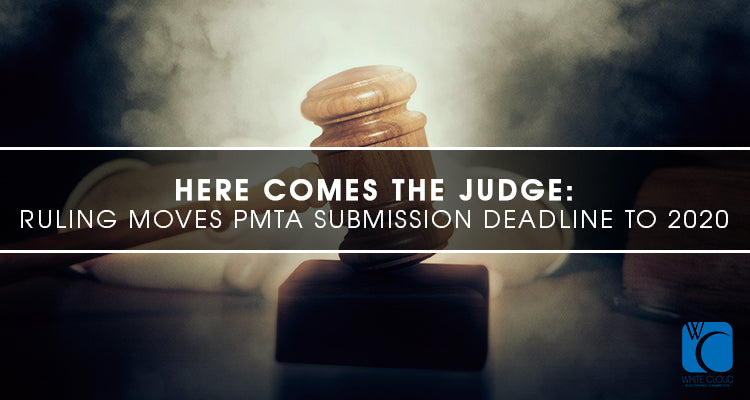Sometimes, all it takes for a government agency to move forward with an agenda is to receive a gentle legal nudge from a federal judge. When it comes to vaping products, the nudge delivered by federal Judge Paul Grimm was far from gentle.
Judge Rules in Favor of New PMTA Deadline

Originally, the Food and Drug Administration (FDA) set a deadline for deeming regulations compliance in 2018, which the FDA extended to 2021 and 2022. Deeming regulations were established for vaping products to be regulated by the FDA, which requires companies to submit pre-market tobacco applications (PTMAs) in order to remain on the market after the set deadline.
Outraged over the extended deadlines, several public health groups, including the American Academy of Pediatrics, American Heart Association, American Lung Association, Campaign for Tobacco-Free Kids, and Truth Initiative filed a lawsuit against the FDA, demanding the deadlines be moved back forward.
In July of 2019, Judge Grimm approved the proposal to move the PMTA submission deadlines to May 11. 2020. The announcement of Judge Grimm’s decree sent financial shockwaves throughout the vaping industry.
What is a PMTA?

A Pre-Market Tobacco Application is part of the rules established for the FDA to regulate tobacco products as part of the Tobacco Control Act of 2009 – right around the time the vaping industry started to take off.
The application requires all products derived from tobacco to enter a lengthy and costly FDA approval process before entering or remaining on the market. In 2010, a court ruling determined that electronic cigarettes could not be regulated as drugs but could be regulated as tobacco products, instead. And so began the FDA’s war against vaping.
After years of lawsuits and pushbacks, the FDA finally deemed all vaping products as “tobacco products” after releasing its Deeming Regulations in 2016. The PMTA process now applies to ALL vaping products, including those not “derived from tobacco”, such as batteries, coils, and other accessories.
This means a PMTA must be submitted for every single product in order for it to enter or remain on the market after the deadline, and with the projected cost ranging between $300K into the millions for each product – a cost no mom and pop vape shop or small vaping company could survive.
With looming deadlines for compliance with FDA regulations, the future of the vaping industry was quite grim (pun intended) as vaping companies and vape shop owners prepared for the expected decimation of nearly the entire industry by November 2018.
Recognizing the issues with the process (and how long it would take for the FDA to actually review all of the applications), the FDA actually extended the deadline to 2022 when new (and now former) FDA Director Scott Gottlieb unveiled a new comprehensive plan for tobacco regulation and stated, “We must recognize the potential for innovation to lead to less harmful products, which, under FDA’s oversight, could be part of a solution” and went on to say, “While there’s still much research to be done on these products and the risks that they may pose, they may also present benefits that we must consider.”
Well, public health groups weren’t happy with that and used the “youth vaping epidemic” and a “violation of the Administrative Procedure Act” as their weapons for suing the FDA. The powerful public health coalition argued the FDA should never have given vaping product manufacturers extensions without first abiding by the legal terms set forth by the Administrative Procedure Act (APA). The public health coalition requested PTMA submissions within four months of a federal judge’s ruling.
Judge Grimm Dismisses Vaping Industry Objections

In a ruling that criticized the vaping industry, while praising the FDA for its efforts to regulate vaping products, Judge Grimm gave the vaping industry 10 months to comply with the new PMTA submission deadline. Vaping companies must submit PMTAs by May 11, 2020.
During the hearing, Judge Grimm complimented the FDA for its handling of the PMTA issues. He said in a statement that the FDA has “made a commendable record detailing their own resources and ability, as well as the negative impact of rushed, unguided applications that would exacerbate their difficulties in timely approving or denying applications.”
On the other hand, Judge Grimm had nothing positive to say about the objections made by representatives from the vaping industry. “The industry contends disingenuously that it cannot complete its applications without further formal guidance. Yet, according to [the FDA], it is commonplace for companies and individuals to call the FDA for guidance, and the FDA has made clear that it is willing to work with manufacturers in the interim to provide informal guidance.”
What the Ruling Means for the Vaping Industry

For the vaping industry, the ruling issued by Judge Grimm has turned what was once viewed as a theoretical problem into an incredible challenge that must be met within a short amount of time. Many vaping manufacturers were surprised by the judge’s ruling and in most cases, the companies did not develop contingency plans that included meeting a much shorter deadline for PMTA submissions. In addition, as of September 2019, the FDA has declared the agency’s intent to move forward with strict regulations that will ban all flavored vaping liquids.
Where we go from here is anyone’s guess, but at this rate, the majority of vape shops and businesses may have no choice but to close their doors for good. However, vaping advocacy groups are still fighting for the industry with yet another lawsuit against the FDA.






